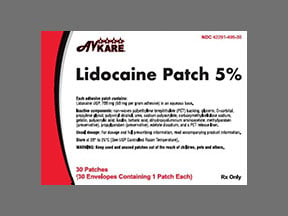
My prescription
Edit
5%, Lidocaine (30 Patches)
Select pharmacy

CVS
$50.93
COUPON PRICE
Walmart
$58.32
COUPON PRICE
Albertsons
$58.54
COUPON PRICE
Walgreens
$67.20
COUPON PRICELidocaine savings card
Show this card to your pharmacist
CVS
$50.93
BIN
ID
PCN
GRP
019876
LH7D9DE8F3
CHIPPO
LHX
Powered by
More prescriptions for postherpetic neuralgia
More prescriptions for postherpetic neuralgia
Price history for Ztlido (brand) & Lidocaine (generic)
30 Patches, 5%
Average retail price for Ztlido
Average retail price for Lidocaine
Average SaveHealth price for Lidocaine
Our price history data is based on aggregated prescription data collected from participating pharmacies in America. Our prescription data updates daily to reflect the latest price changes. If you notice a missing data point, it means there wasn't sufficient data available to generate a monetary value for that date.
We analyzed Lidocaine prices for (5%, 30 Patches) over the last 12 months. The average retail price was $36.74, while the average price using the SaveHealth discount card was $34.91. That's a savings of approximately 4.98% when using our Lidocaine coupon.
Compared to the generic version, Ztlido had an average price of $769.54 over the same time period. With the SaveHealth savings card, Lidocaine is 95.46% cheaper on average than Ztlido.
*Retail prices are based on pharmacy claims data, and may not be accurate when we don't have enough claims.
Lidocaine dosage forms
Dosage Quantity Price from Per unit 3.5% 10 Patches $90.66 $9.07 4% 1 Patch $9.95 $9.95 4% 10 Patches $18.54 $1.85 4% 15 Patches $23.31 $1.55 4% 30 Patches $37.62 $1.25 5% 30 Patches $50.93 $1.70 5% 1 Patch $4.36 $4.36 5% 3 Patches $8.08 $2.69 5% 5 Patches $11.80 $2.36 5% 9 Patches $19.25 $2.14
| Dosage | Quantity | Price from | Per unit |
|---|---|---|---|
| 3.5% | 10 Patches | $90.66 | $9.07 |
| 4% | 1 Patch | $9.95 | $9.95 |
| 4% | 10 Patches | $18.54 | $1.85 |
| 4% | 15 Patches | $23.31 | $1.55 |
| 4% | 30 Patches | $37.62 | $1.25 |
| 5% | 30 Patches | $50.93 | $1.70 |
| 5% | 1 Patch | $4.36 | $4.36 |
| 5% | 3 Patches | $8.08 | $2.69 |
| 5% | 5 Patches | $11.80 | $2.36 |
| 5% | 9 Patches | $19.25 | $2.14 |
| 5% | 14 Patches | $28.55 | $2.04 |
| 5% | 15 Patches | $30.41 | $2.03 |
